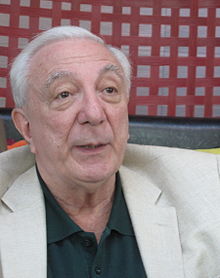John Casti
| John L. Casti | |
|---|---|
| Born | 1943 Oregon, U.S.A. |
| Residence | Vienna, Austria |
| Nationality | United States |
| Fields |
Mathematics |
| Institutions |
X-Center (founder ) |
| Alma mater | University of Southern California (Ph.D.) |
| Notable awards | Association of American Publishers |
Mathematics
Scientific Modeling and Prediction
Computer Simulation
Social “mood” effects on future trends and events
X-Center (founder )
Center for Complex Systems and Enterprises at the Stevens Institute of Technology (Senior Research Fellow)
Qforma – (Co-founder)
SimWorld – (Co-founder)
Santa Fe Institute – (External Faculty)
International Institute for Applied Systems Analysis (IIASA) – (Senior Research Fellow)
Technical University of Vienna - (Professor of Operations Research and System Theory)
Princeton University – (Faculty)
New York University – (Faculty)
University of Arizona – (Faculty)
John L. Casti (born 1943) is an author, mathematician, and entrepreneur.
As an author, Casti has written more than 120 scientific articles and seven technical monographs and textbooks on mathematical modeling. In addition, he was formerly editor of the journals Applied Mathematics & Computation (Elsevier, New York) and Complexity (Wiley, New York). In 1989 his text/reference works Alternate Realities: Mathematical Models of Nature and Man (Wiley, 1989) was awarded a prize by the Association of American Publishers in a competition among all scholarly books published in mathematics and the natural sciences. In 1992, he also published Reality Rules (Wiley, New York), a two-volume text on mathematical modeling. In addition to these technical volumes, he has written fourteen popular books on science. These include Paradigms Lost: Images of Man in the Mirror of Science (Morrow, NY, 1989), which addresses several of the most puzzling controversies in modern science, Searching for Certainty: What Scientists Can Know About the Future (Morrow, NY, 1991), a volume dealing with problems of scientific prediction and explanation of everyday events like the weather, stock market price movements and the outbreak of warfare, and Complexification (HarperCollins, NY, 1994), a study of complex systems and the manner in which they give rise to counterintuitive, surprising behavior. Dr. Casti has also written three popular volumes on mathematics: Five Golden Rules: Great Theories of 20th-Century Mathematics---and Why They Matter; a sequel, Five More Golden Rules (1995, 2000) both published by John Wiley & Sons (New York); and Mathematical Mountaintops: The Five Most Famous Problems of All Time, published and later recalled by Oxford University Press (New York). In addition, in 1996 he published Would-Be Worlds, a volume on computer simulation and the way it promises to change the way we do science, also published by John Wiley & Sons (New York). In 1998 he published a volume of scientific fiction, involving Ludwig Wittgenstein, Alan Turing, J. B. S. Haldane, C. P. Snow and Erwin Schrödinger in a fictional dinner-party conversation centered about the question of the uniqueness of human cognition and the possibility of thinking machines. This book was published under the title The Cambridge Quintet by Little, Brown (London) in December 1997 and by Addison-Wesley in the US in early 1998. More recently, his published books include Art & Complexity (Elsevier, Amsterdam, 2005), a volume edited with A. Karlqvist, as well as a short volume on the life of the Austrian logician, Kurt Gödel, the book Gödel: A Life of Logic (Perseus Books, Cambridge, MA, 2003). In the same year he published the volume, The One, True, Platonic Heaven (Joseph Henry Press, Washington, DC, 2003), which addresses in a fictional format the question of the limits to scientific knowledge. The volume on art and complexity sparked off a continuing interest in the interrelationship between complex systems and artistic forms of all types, which is reflected in a set of papers currently in preparation addressing the complexity of scientific theories regarded as artistic forms.
...
Wikipedia

